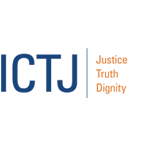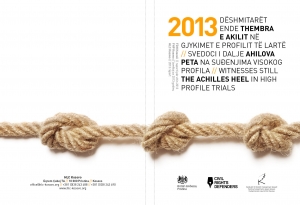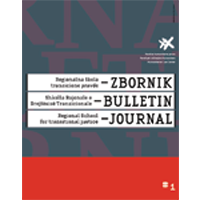

 This issue of the Bulletin deals with matters relating to EU legislative solutions in the area of the rights of victims and the inevitable harmonization of local regulations with the provisions applicable to states striving to become members of the EU. Even though it seems as if this area of interest did not find a place in Serbia’s EU accession process negotiations, the Director of the British non-governmental organization Redress, Carla Ferstman, maintains that this will inevitably become part of the matters under negotiation.
This issue of the Bulletin deals with matters relating to EU legislative solutions in the area of the rights of victims and the inevitable harmonization of local regulations with the provisions applicable to states striving to become members of the EU. Even though it seems as if this area of interest did not find a place in Serbia’s EU accession process negotiations, the Director of the British non-governmental organization Redress, Carla Ferstman, maintains that this will inevitably become part of the matters under negotiation.
The Bulletin also communicates the exceptionally relevant experience of the Croatian civil society in their recently completed EU accession process. The Director of the Croatian human rights organization Documenta, Vesna Teršelič, writes about the problems, challenges and opportunities that the EU accession negotiations bear for civil society organizations, as well as the importance of the political will within future member states and the European institutions, as regards their involvement in the process.
And, at the end, there are columns in the Bulletin offering an overview of events and war crimes trials in the period following April 1st, 2014.
You can send us your comments on the newsletter at: towardsJUSTICE@hlc-rdc.org and join the discussion at Twitter/#towardsJUSTICE.
Download third issue of the newsletter here.
 The Humanitarian Law Center (HLC) supports post-Yugoslav societies in the promotion of the rule of law and acceptance of the legacy of mass human rights violations, and therefore in establishing the criminal responsibility of the perpetrators, serving justice, and preventing recurrence.
The Humanitarian Law Center (HLC) supports post-Yugoslav societies in the promotion of the rule of law and acceptance of the legacy of mass human rights violations, and therefore in establishing the criminal responsibility of the perpetrators, serving justice, and preventing recurrence.
Audit report for 2013.

 The European Union has played a pivotal role over the last decades in ensuring respect for human rights and the rule of law in a long list of new member states running from the Baltic to the Aegean. It has done so by requiring candidate states to undertake difficult reforms, including tackling past and present human rights abuses. Serbia, which now is a candidate for EU membership, has much to do to address its long and troubling legacy of human rights violations before it can claim this prize.
The European Union has played a pivotal role over the last decades in ensuring respect for human rights and the rule of law in a long list of new member states running from the Baltic to the Aegean. It has done so by requiring candidate states to undertake difficult reforms, including tackling past and present human rights abuses. Serbia, which now is a candidate for EU membership, has much to do to address its long and troubling legacy of human rights violations before it can claim this prize.
 As part of the project Monitoring of Trials for War Crimes and Politically and Ethnically Motivated Criminal Offences, the Humanitarian Law Center Kosovo (HLC Kosovo) during 2013[454], continued with the systematic monitoring and analysis of the progress of the most important trials in Kosovo, since these trials attract the greatest attention of professional and general public, monitors, printed and electronic media, civil society and non-governmental sector, as well as international human rights organizations.
As part of the project Monitoring of Trials for War Crimes and Politically and Ethnically Motivated Criminal Offences, the Humanitarian Law Center Kosovo (HLC Kosovo) during 2013[454], continued with the systematic monitoring and analysis of the progress of the most important trials in Kosovo, since these trials attract the greatest attention of professional and general public, monitors, printed and electronic media, civil society and non-governmental sector, as well as international human rights organizations.

 The Regional Transitional Justice School Journal is a product of the Regional School for Transitional Justice, organised by the Humanitarian Law Center (HLC), the Lawyers’ Association from Sarajevo and HLC Kosovo, with the support of the British Embassy in Belgrade.
The Regional Transitional Justice School Journal is a product of the Regional School for Transitional Justice, organised by the Humanitarian Law Center (HLC), the Lawyers’ Association from Sarajevo and HLC Kosovo, with the support of the British Embassy in Belgrade.

 The second issue of the newsletter through Accession towards JUSTICE contains pieces written by International Center for Transitional Justice President Mr. David Tolbert and Sense Agency journalist Nemanja Stjepanović.
The second issue of the newsletter through Accession towards JUSTICE contains pieces written by International Center for Transitional Justice President Mr. David Tolbert and Sense Agency journalist Nemanja Stjepanović.
The newsletter wishes to underline how important it is for a country aspiring to join the community of European nations, but also for the EU itself, to initiate the process of dealing with the past. History has shown that unresolved issues of the past are always present, hampering the functioning of a political system, be it a state or a community of states. Therefore, both the Republic of Serbia and the EU Members States have an obligation to secure a stable political and legal system for their citizens, a system governed by the rule of law, which will guarantee the protection of and respects for human rights of its citizens.
You can send us your comments on the newsletter at: towardsJUSTICE@hlc-rdc.org and join the discussion at Twitter/#towardsJUSTICE.
Download second issue of the newsletter here.

 On Friday, 28th March 2014, a round table discussion Education for Reconciliation:theRole of Education in the Processes of Determining Responsibility and of Reconciliation, and the presentation of a collection of papers written by Regional Transitional Justice School students, took place in the Library of the Union University Law School in Belgrade. The round table, organized jointly by the Humanitarian Law Center, the Union University Law School and the Center for Advanced Legal Studies, was opened by Professor Zlatko Stefanović, Dean of the Union University Law School, and Marijana Toma, Coordinator of the Programme for Education at the Humanitarian Law Center. Participants included professors at the Union University Law School and Belgrade University, associates from various scientific institutes, alumni of the Regional Transitional Justice School, and Belgrade University and Union University students.
On Friday, 28th March 2014, a round table discussion Education for Reconciliation:theRole of Education in the Processes of Determining Responsibility and of Reconciliation, and the presentation of a collection of papers written by Regional Transitional Justice School students, took place in the Library of the Union University Law School in Belgrade. The round table, organized jointly by the Humanitarian Law Center, the Union University Law School and the Center for Advanced Legal Studies, was opened by Professor Zlatko Stefanović, Dean of the Union University Law School, and Marijana Toma, Coordinator of the Programme for Education at the Humanitarian Law Center. Participants included professors at the Union University Law School and Belgrade University, associates from various scientific institutes, alumni of the Regional Transitional Justice School, and Belgrade University and Union University students.